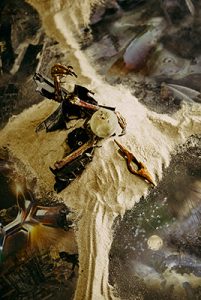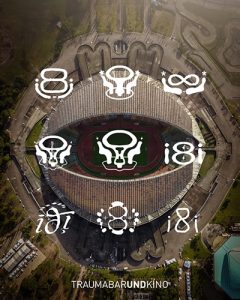Memory-making takes about 15 to 30 seconds in the brain. This becomes a site for interrogating humanity’s accelerated existence in ‘Host’, a cross-media project with text by Matilda Tjäder and Nikhil Vettukattil on speculative realities and post-industrial life that’s sonically interpreted into a score by DÆMON (Jahsiri Asabi-Shakir), releasing via Country Music on January 19. The text follows vignettes of Shwar, Lee, and Alex, embellishing and excessively detailing the nuances of their respective lives into something greater than their individual experiences. The character’s sensations and memories are slowed down to create this effect, lending to the construction of a hyperreal milieu which becomes the focus of Tjäder and Vettukattil’s writing.
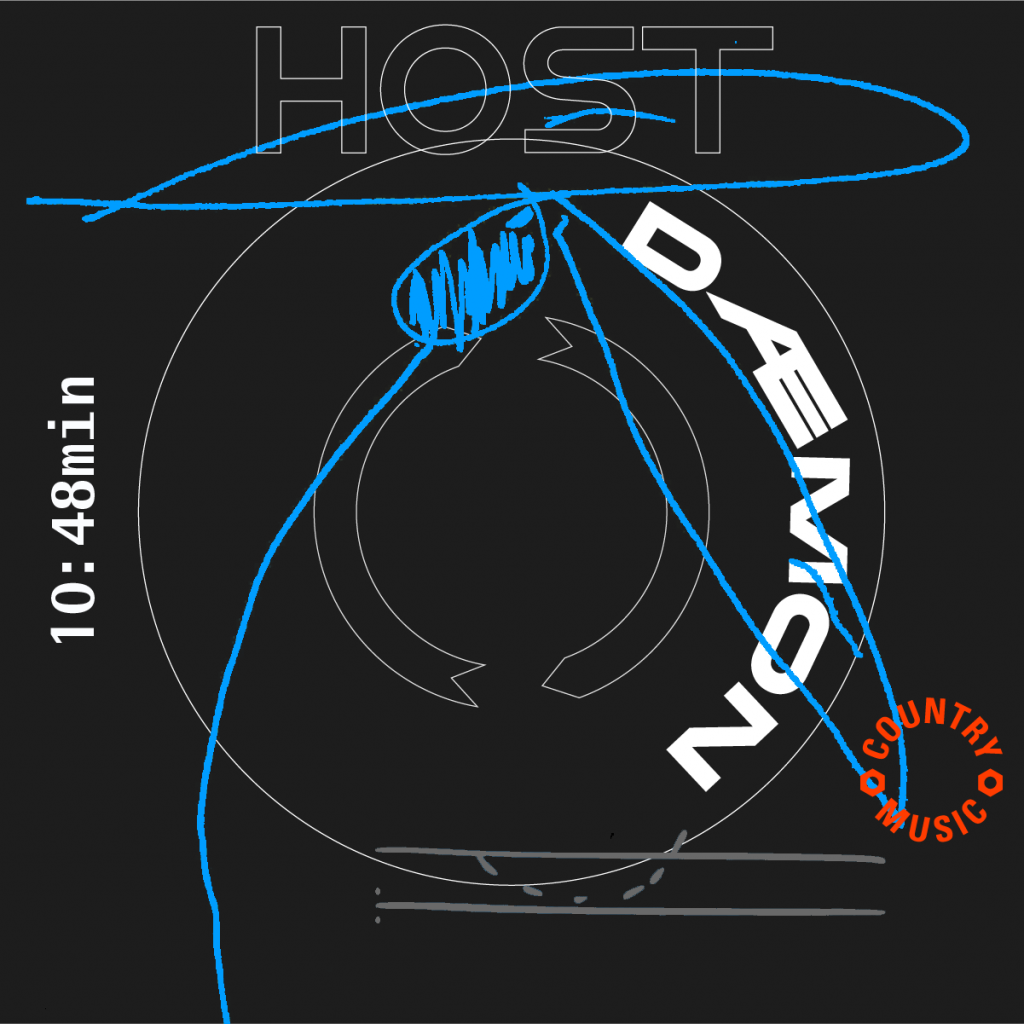
‘Host’ examines sensation, memory, and human factors according to three focuses shared by the group’s respective practices. Tjäder and Vettukattil cover topics of perception and technology across literary and scientific inquiry. They recently contributed to the Housewarming at London’s 3236RLS that ran from November 9 to January 11 2021. Under the DÆMON moniker, Asabi-Shakir explored similar concepts in ÆOS, a fictional technology that is the subject of his album released under the same title on Chino Amobi’s Intelligent Models in 2018.
DÆMON continues this perspective into the ‘Host’ score with the help of Zurich-based producers Modulaw and Xzavier Stone, abstracting the written narratives into a totalized sonic form of subdued ASMR vocals and granular synthesis that displaces the reader from knowing where they are in the storylines. The track swells into a pulsating mass of bird caws and muttered vocals, driving the overwhelming nature of it all to a concussion-inducing end. A faint ringing in the ears leaves a final impression.
Here the trio and Country Music co-founders, Daniel Iinatti and Anna Sagström, correspond over email to discuss the disarming world of this project that would otherwise seem like a fairly normal place.
**How did all of you get in touch for this collaboration?
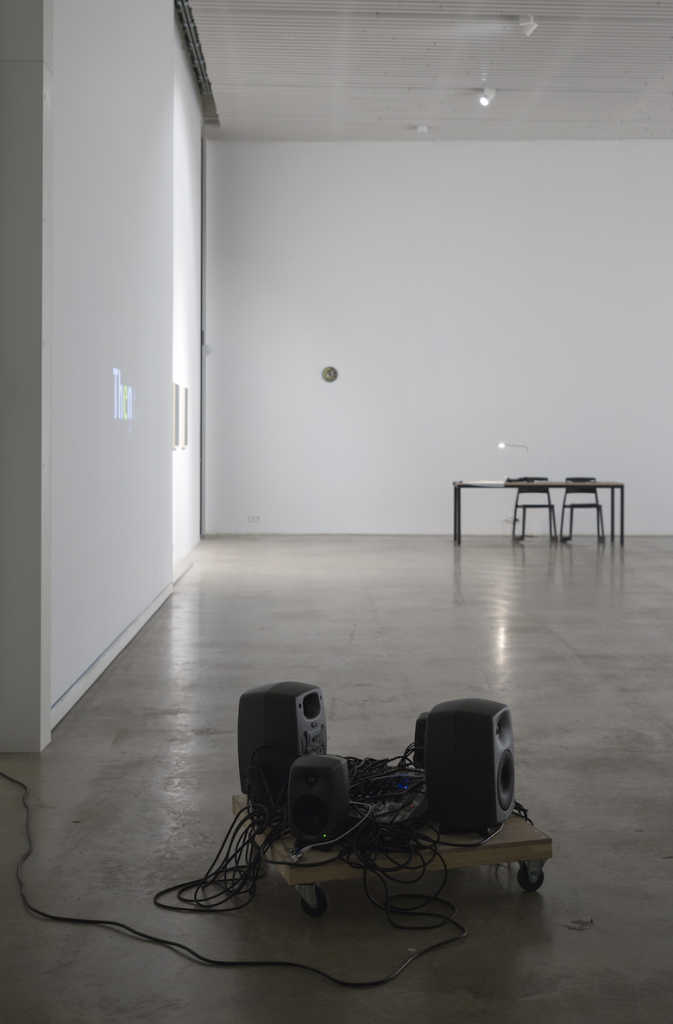
Country Music: It was always our intention to collaborate with writers and release texts as well as music and other projects. Initially our thought was to consider the club as a place for reading in gaps of dancing; resting at the bar, standing in line, bringing an essay home to wake up to. But the texts and writers started to feel so dear to us beyond that moment of the night that it felt natural to continue to mesh them into the project through further collaborations and formats, and thus the audio interpretations began to happen.
This one happened slightly differently since Matilda and Nikhil’s text was part of an exhibition Country Music curated in Tallinn called The Hum, originally slated to open in March of last year but postponed because of the pandemic. We had been wanting to work with Matilda and Nikhil for a long time, being friends and long-time admirers. The exhibition felt like a great opportunity to develop something together over a longer period of time. They then got complete say in who they wanted to work with for the audio piece, and we were thrilled to hear that they wanted to work with Jahsiri.
Jahsiri Asabi-Shakir: It was an accumulation of crossed paths and mutual respect for our respective crafts that brought us together. I was familiar with the ‘Host’ text when Matilda and Nikhil reached out to me and I immediately engaged with the piece, in which I found stark imagery to pull from. I followed my inclination and reached out to producers Modulaw and Xzavier Stone, who were critical in the production and recording process. The process was an unfolding of the quilt—a concerted effort to fully realize the text in the sonic space.
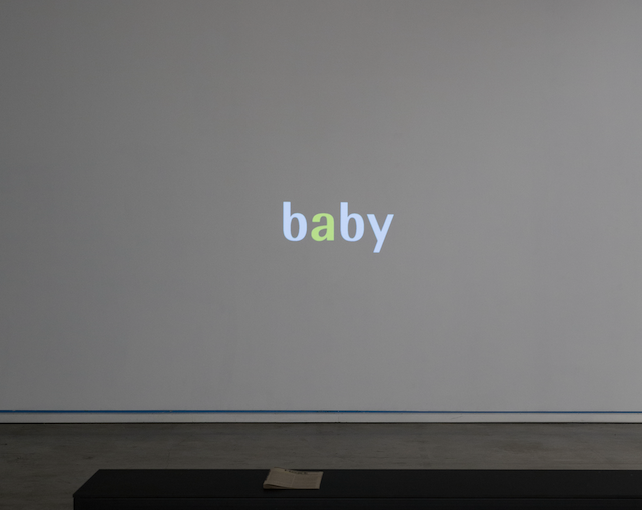
Matilda Tjäder: We wanted to work with someone with a strong energy and integrity in their sound, and with Jahsiri’s work there’s a sense of spatiality that leaves room for unfinished thoughts. The thread and shared interest in storytelling and fiction was already in place from knowing each other on a personal level, so it felt like a natural extension from the conversations we’d already engaged in with Anna and Daniel. We’d also collaborated with Jahsiri earlier in 2020 for the closing event of Housewarming an exhibition Nikhil and I and Asta Lynge did together at 3236RLS/Les Bourgeois in London. For the event we invited writers and musicians to perform in the midst of the exhibition. Jahsiri created intermittent sound pieces or ‘capsules’ from field recordings of his that ended up tying all of the acts together.
Nikhil Vettukattil: Yeah, and those sound pieces also had a sense of embodiment and place that later we were looking for in relation to the text.
**It’s definitely timely for ‘Host’ to be about fractured ecologies. Did the pandemic or anything else impact any how each of you made your contributions?
NV: Not in terms of the writing, although the pandemic has certainly coloured re-reading the text.
MT: For instance, the text is often about the sentient memories that appear when time is slowed down, the exposure to noise pollution is reduced, and social interaction is limited to an isolated physical space—something that many of us have experienced throughout the pandemic. And then there is Shwar, one of the stories’ three characters, and her obsession with collecting the herb Rhodiola, an adaptogen that helps the body adapt to emotional and mental stressors.
NV: Another of the key characters, Lee, is also living a kind of confined existence as a result of certain actions in his past. It made us reflect on how much the psychological spaces we were thinking of already had taken root before the pandemic; that certain dynamics were already somehow in place.
**The text takes us through complicated representations of the serene and urbanity. Do you see a relationship between them?
NV: When Shwar arrives at the island at first, it’s like sensory deprivation, all the sensations she hasn’t really processed start spilling over from the past. It’s really the shock of the city that gives the illusion of peace to her surroundings. It takes a while for the two of them to realise even the most unassuming forms of nature turn poisonous in the right quantities. We wanted to explore the precise ways these things dissolve, who or what is the host, how long is the guest a stranger, and the stranger a guest.
MT: Lee and Shwar both embody a certain conflict in their ways of trying to cope and exist in peace with their surroundings. Shwar’s devotion to her research on phenotypes and how species acquire certain traits from their environment continuously leads her to a degree of involuntary isolation. Lee’s ‘condition’ as a hypersensitive with no filter to the noise that passes through him makes him susceptible to sensorial impressions. This conflict and paranoia that emerge from containing too much noise within the body is both eased and complicated via their relationship to Alex who appears as an external force/signal without a clear envelope.
**I ask because the audio collapses the chapters into a single perspective, creating a continuum out of these concepts. Can you talk about this?
JAS: I wanted to create a fluid scene—a one-shot pan through the story line encompassing its textures and moods, while trying to immerse the listener in the carousel of scenery afforded by the text. We approached the project like a score to a film, attempting to bring the settings of the text to life through sound. After scanning the text for notable imagery and sonic references, we attempted to create an immersive first-person ASMR experience from the perspectives of the various characters throughout.
**Was there a reason you chose not to include distinguishable voices?
JAS: Our primary goal approaching this project wasn’t to directly represent individual characters, but more so to sonically recreate the universe in which the story exists. The subtle tonality and intimate mutterings of the various vocal characters I embodied were intended to represent the respective and shared sentiments of each character. Each repetition of the mantra ‘Es ist ein Zustand’—voiced by Yara Gisler—is representative of the beginning, or end, of each chapter.

**Last question—if ‘Host’ were to be set in a place, where would it be?
MT: Like Shwar’s research, the characters in ‘Host’ are products of their surroundings. They’re equipped with filters that allow their own material spillage to be made visible to them, like collected evidence of shifting environments.
NV: ‘Host’ was based in some way on the feeling of places we both know in common, but are brought into a more unfamiliar configuration. It’s definitely got aspects of an extreme northern cold, but the severe environment is exaggerated against Lee and Shwar’s memory of more forgiving climates. It’s the post-industrial, small-town energy we were raised in, but it’s washed out in the blur of the globalised non-space we can’t find a way out of. On a quiet coastal walk, you still hear the ocean of highway traffic from the mainland.**
